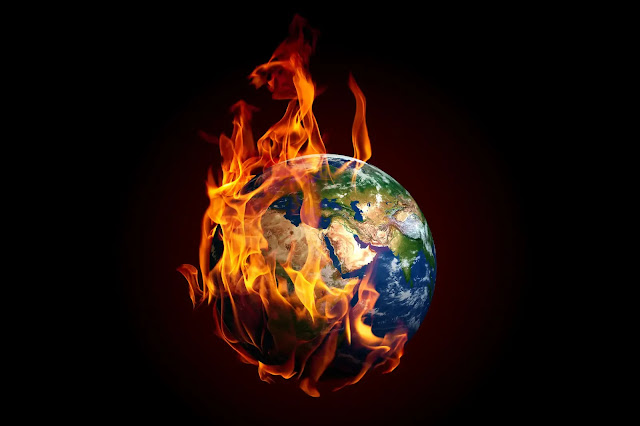For
a while now I’ve been tinkering with my concise, concrete,
comprehensive position statement (PS) on the alarming present and future state of the
planet and what it means. Like a broadside
hung up at your post office to get you to enlist for the war or to be
on the look out for America's most wanted, I am trying to get you
r attention.
If its meaning is impactful enough, it ought to spur us into action. We are not easily spurred into
action by matters of fact, though. We science educators run into trouble with their overuse, which can easily lead to dulling yawns and what-else-is-new?
apathy. So I have tried to "de-sciencefy" it to increase clarity and use clever cause and effect strings for heightened interest.
Hope in the face of seemingly insurmountable odds is yet possible, and if it alarms you enough to open the link at the end you will find a wonderful,
more in-depth statement that I
discovered this morning by the director of our local land trust, based
on the 2021 report by the United Nations Intergovernmental Panel on Climate Change. Hope means knowing what effective responses you can make.
So here goes.
For thirty years I taught environmental systems science to high school students, with an emphasis on human-caused rapid global climate change. It is thus no accident that young people like Greta Thunberg are leading the public outcry regarding the impacts of rising pollution and heat-trapping gases from burning fossil fuel. They come storming into our polite summits prepared with a scientific literacy that includes an understanding of how interconnected are the world’s natural life-support systems, balanced by means of negative feedback.
Now unbalanced, the feedback is turning positive. For instance, ever more trapped heat dries out more forest, which burns more easily, which releases more heat trapping carbon dioxide gas, which melts more polar ice, which exposes darker water to sunlight, which is absorbed as heat instead of reflected as light back to space, which warms the poles, melts even more ice and releases methane gas, with 80 times the heat-trapping capability of carbon dioxide, from former permafrost, all which accelerates the rate of heat entrapment.
The great oceanic carbon sink is losing its capacity to further absorb excess atmospheric CO2 because gases are less able to mix with liquids as they warm. Moreover, oceans are already poisoned by carbonic acid that the gas causes when mixed with water.
The great terrestrial carbon sink, the Amazon, is turning into a savanna because the loss of carbon-sequestering forest is weakening rainfall, which makes harvests lower, which gives farmers an economic motivation to clear more land to make up for lost production, which means more fires and less rain.
Fluid circulation of air and water around the globe that once swirled in balanced, uniform cycles has started to “wobble,” like a toy top does as it slows. These changes are giving new names to old, once rare events, including polar vortexes, high pressure heat domes, bomb cyclones, and atmospheric rivers.
Once normal, large scale patterns of winds and interactions between shallow and deep-water oceanic currents that regulate the distribution of heat and moisture around the planet are being disrupted. As positive feedback drives change to critical tipping points, change accelerates and is harder to reverse.
Insurance companies are abandoning California and Florida because of too frequent and too intensive, heat-driven hurricanes blowing more water in heat-expanded seas inland, wrecking and drowning coastal cities teaming with increasingly unaffordable housing.
Greed that blinds us into denial of objective facts regarding environmental limits and their now increasingly obvious consequences has granted us a peak at the Apocalypse we are bringing upon ourselves.
To be unequivocal, this crisis is the most massive, complex, and decisive challenge to modern civilization.
Phew! Sucks to be us. What to do? The great warming since the dawn of the industrial age is 1.1 degrees Celsius. That is an unequivocal scientific fact. We see the effect. We are involved. No one is exempt. Everyone must act. Because everyone knows about "earth-rise" from the Apollo 8 space mission. That's us, remember? We are there on our only home. We can destroy it. We can heal it.
But let's face that fact, born out of basic anthropology. Most people look upon scientists as Cassandras whose warnings can be
ignored. "Sure, it is hotter; sure, forest fires are raging; sure,
storms are bigger. But I have more immediate concerns to worry about" is
the response of most people. That keeps the politicians from willing to make the hard decisions that will save us from the coming apocalypse. We must save ourselves. Things get done when we do them. And we do them when there is hope.
An encouraging response that kindles hope and enables me and my neighbors to get involved is conservation of the terrestrial carbon sink found at our local level here in Maine. It is discussed by the director of Blue Hill Heritage Trust at this link.




No comments:
Post a Comment